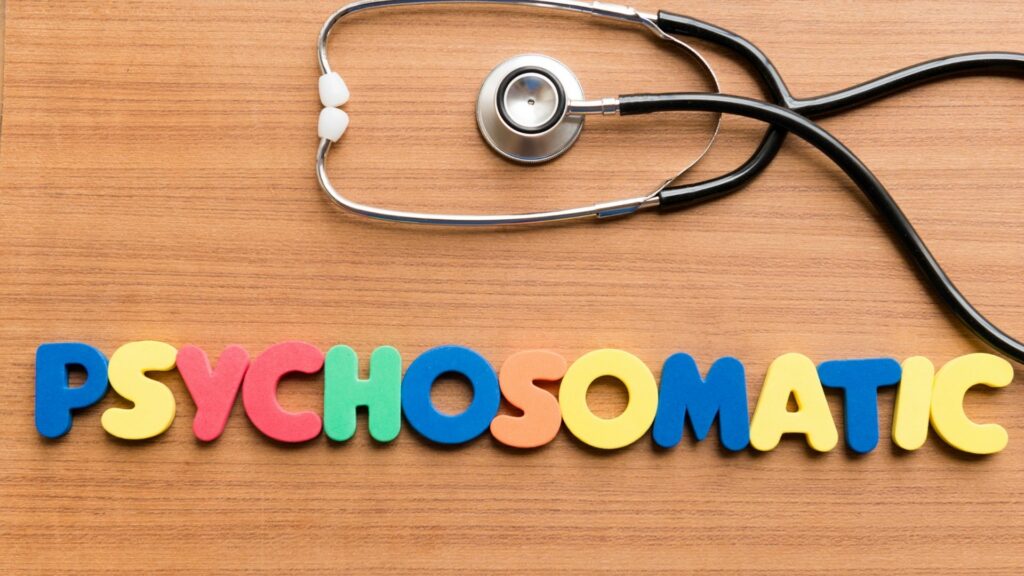Contents
Psychosomatic Illness: Uncommon Mental Illnesses
Psychosomatic disorders are illnesses that can be caused by mental stress or emotional distress. Psychologists and psychiatrists have come to the conclusion that many of these conditions may not be physical in nature. Instead, they stem from a mental illness such as depression. Psychogenic pain is an example of this type of disorder. Psychogenic pain, also known as somatic symptom disorder, is a condition in which people experience chronic unexplained body pain for which no medical cause can be found and functions like other psychosomatic disorders in that it stems from underlying psychiatric issues rather than organic causes.
What Is Psychosomatic Illness?
 The term psychosomatic is used to describe genuine physical symptoms that are caused or influenced by the mind and emotions rather than an underlying organic cause (such as a wound or infection).
The term psychosomatic is used to describe genuine physical symptoms that are caused or influenced by the mind and emotions rather than an underlying organic cause (such as a wound or infection).
Emotional stress causes or exacerbates a psychosomatic illness, which is in the body as physical discomfort and other symptoms. Depression can also cause or worsen psychosomatic disorders. Especially if the immune system has been damaged by severe or continuous stress.
The belief that psychological disorders are imaginary or “all in the mind” is a widespread misconception. Physical symptoms of psychosomatic diseases are genuine and must be treated, just like any other illness. Unfortunately, effective therapy isn’t always available on time or in a timely manner.
Because of the widespread social stigma associated with psychosomatic illness, many individuals may be hesitant to get help. Even when someone does seek treatment, stigma is present in both the research and medical communities at least in part due to a lack of knowledge about how stress causes illness.
Psychosomatic Symptoms
 We all experience stress from time to time. You may not have paid much attention to the various physical ways that stress manifests itself, but learning how to identify when you’re under a lot of pressure can be beneficial. Once you’ve identified the symptoms, you may work on reducing the negative impact stress has on your health.
We all experience stress from time to time. You may not have paid much attention to the various physical ways that stress manifests itself, but learning how to identify when you’re under a lot of pressure can be beneficial. Once you’ve identified the symptoms, you may work on reducing the negative impact stress has on your health.
While it may appear to be a difficult task, there are actually a few simple methods to determine whether you’re under severe stress. Physical symptoms of stress include:
- When you have butterflies in your stomach, it means you are nervous about something.
- Sometimes your heart beats really fast.
- Sweaty hands
- When people are tense, their muscles are tight.
Some people with stress feel fatigued even when they get enough sleep. Others may feel irritable, have bloating in their stomachs, and change periods. Men with stress may have chest pain; high blood pressure; and decreased sex drive.
Symptoms of stress also vary by age. Children often show their stress through their body, because they don’t know how to talk about it yet. For example, a child who is having a hard time in school may have stomachaches and be sent home from school.
When your youngster is under severe stress, communicate with them and listen to what they’re saying. It’s important to stay calm and keep your voice level while engaging in a long-distance argument. Understand that sadness and anger will come and go for many kids throughout their adolescent years; however, other feelings like anxiety or worry may follow this period of grieving. While it’s important to be a role model for healthy communication, make sure they know that it is okay to feel sad or angry.
A person who is old can get very sad. They might have a lot of problems, like being alone or having a serious health problem. If you are taking care of someone older, know all about depression in older people.
Causes Of Psychosomatic Illness

There are various forms of stress, some of which may be beneficial. Eustress is the force that makes life exciting and interesting. It’s a sensation that makes you want to get out of bed in the morning and keeps you going.
If you’ve ever experienced the thrill of a roller coaster ride or felt a sense of accomplishment while completing a project, you’ve experienced “good” stress. However, if you’ve ever gone through a major loss, had to undergo major life changes, or been exposed to other stressful situations, you’re also aware of what “bad” stress feels like.
You can sense the joy and uplifting sentiments of excellent stress all over your body, much as bad stress has adverse psychoemotional ramifications. While the precise mechanisms are unclear, scientists have determined that tension and sadness may be experienced in physical terms. It’s a complicated procedure, but here’s an illustration to help you understand it.
When the cooker is full of steam, it works well. If you let out the steam, it will work well. It will be able to handle pressure better if there is not too much pressure. But if you have a lot of pressure in the cooker and put more on top, it will break at its weakest point.
Stress-related illness is most likely to develop where your body is already harmed, like with the pressure cooker yielding at the weakest point of its structure.
The typical mental illness description includes a lot of words that relate to sadness and depression. A person who is under pressure and unable to “vent” their feelings or who tries to suppress everything will eventually hit an emotional breaking point. It might show up as physical symptoms or set off a severe episode of depression.
If you have always had back pain, it may be worse when you are under severe stress. You may also have stomach problems and headaches. This is because stress can cause these things to happen to your body.
Your immunity can also be hampered by stress. When people are stressed, they’re more likely to catch a cold or the flu, according to certain research. They may also acquire additional infections and take longer to recover.
These chemicals are an important component of the “fight or flight” response to stress and can be quite beneficial. However, if the body is open to excessive quantities or released in rapid succession over a long time, these chemicals might cause more harm than good.
Psychosomatic Illness Diagnosis

When you visit your doctor with physical complaints, they will generally start by conducting a medical examination to rule out any potential physical causes. If there is no clear physical explanation for your pain that they can easily check for, determining a diagnosis and treatment plan may be difficult.
When this occurs, patients may believe their doctor isn’t taking their issues seriously, thinks they’re making it up, or that it’s all in their head. If your doctor can’t find a visible physical cause for your suffering (such as an injury or an infection), they might inquire about how you feel emotionally.
When they ask about stress in your life, a doctor does not mean to imply that your pain is unreal. Symptoms brought on by stress that you feel in your body are genuine; they’re distinct mechanisms than if you broke a bone, for example.
Treatment For Psychosomatic Illness

Your doctor may want you to talk to a mental health professional. That is not the only thing he will tell you to do though. He may also tell you that it is important for you to learn how to manage your stress and he can help teach you how. But this can take time, so in the meantime, it is very important for you to learn how to manage your stress on your own. For example, if you have pain in your neck, you can learn to not let it bother you. The pain is not only in your mind.
While stress initially begins in your brain, it may result in a chain reaction of chemicals throughout your body, which produces muscular inflammation and pain. To manage your discomfort, you might need anti-inflammatory medications or another form of therapy, such as massage and physical therapy.
Consider a flooded river that results from a dam breaking to be an apt metaphor. The most essential step to preventing more flooding is to repair the dam, but it’s also critical to manage the water that has already inundated your property while the dam is being restored.
How To Prevent Stress?

After knowing how to detect when in stress and the sources of stress in your life, the next stage is to learn coping skills. One of the first (and most essential) is to let out your emotions rather than suppress them.
Stress builds up in your body, just like steam in a pressure cooker. Whatever pressure has built up in your system will come out one way or another. Instead of allowing stress to find an open door and explode, the healthiest thing you can do is develop a controlled mechanism for “venting.”
If you’ve been smoking, stop now. It’s not only bad for your health; it may also make it harder for you to quit cigarettes if you already smoke. See whether you’ve been employing any unhealthy coping methods such as overusing alcohol. There are many ways to cope. The best way for you is a matter of testing different methods and seeing what works best. Here are some ideas to start with:
- Be honest with others (and yourself)
- Tell a friend what is happening
- Do something nice for someone else. Make sure you do something nice for yourself as well.
- A balanced diet, exercise, and a calming space help you feel better
- Explore new ways to deal with stress. You could try different things
- It’s good to join a group that will help you. People there will know things and they can help you
- Some people need to learn relaxation techniques so they can relax
- Drop your anger or bad feelings. Thoughts that are not good for you. Drop relationships that are not helping you
- When you’re not working, make time for the things you like to do
Remember that everyone is different. When two people are in the same stressful situation, they will react very differently. Once you understand how stress affects you, you can work on finding healthy and effective ways to manage it.
Conclusion
As you can see, psychosomatic disorders are very much real and they stem from a mental illness such as depression. These conditions may not be physical but instead, the root of the problem is more likely in your brain. If you think that this might apply to yourself or someone close to you, it’s important that you seek help quickly so that treatment can start sooner rather than later. With any luck, with some professional guidance and therapy sessions, these debilitating illnesses will soon become manageable enough for people to live life without pain again. Have you ever had an experience where something seemed like it was “all-in-your-head”?
If you are looking for affordable Online Counseling MantraCare can help: Book a trial therapy session


